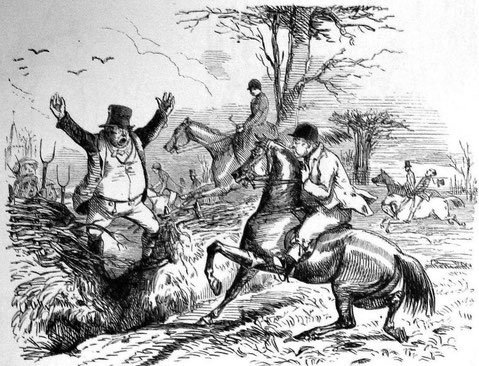“The Hunting Parson”
History tells us of life’s two certainties “death and taxes”. Evidence of this fact is to be found in the Barony of Tireragh in West Sligo as elsewhere.
In former times the clergy of the Established Church (Protestant) derived part of their income from tithes: an annual tax level upon the produce of the parish. Usually wheat, barley, oats, wool and flax. Potatoes were exempt. The method of assessment was ten per cent of the value of the crop in cash or in kind collected by a middleman. The crop to be protected after harvesting until collected by the beneficiary . The middleman or proctor collected a percentage of the value of the crops. This valuable service could in turn be bought and sold, similar to letting a field or farm. This competitive edge tended towards high valuations of the taxable crops and was much resented by the landholders.
The system of buying and selling the Title agency was resented by the small land holders who were mostly Catholic in Dromore West in the early decades of the nineteenth century. In 1806, it is recorded gangs went about instructing farmers not to take the crops to a place nominated by the local clergyman but to leave him the job of drawing the tax crops home himself. This action, in breach of the letter of the law resulted in more than one hundred cases before the courts.

In the autumn of 1829 “The Sligo Observer” newspaper reported a serious outrage in parts of the Barony of Tireragh., due to the actions of the “The Rockities” an illegal covert group. “The Journal” of the same date carried reports of outrages at this time, of “a threatening notice posted on the door of Seafield school-house” In effect that “vengeance on the Master for having purchased the tithes from the Rev. Wm Grove.” On the same night an armed party broke into the houses of two men, tenants of Thomas Hillas Esq. whom they placed on their knees and swore them to give up the tithes of the townland which they had purchased. Threatening them with summary vengeance if they disobeyed.
In a subsequent issue of the “Observer”, it described the title system as “one of the most aggravated evil’s, with which the poor of Ireland has to contend” (It) singled out the Rev. Grove as one of the beneficiaries of the “good living which the law prescribed for fattening the pastors of the establishment and for thinning their flocks”
| Sligo historian John McTernan tells us that Reverend William Grove, Rector of Kilmackshalyon succeeded his father in that position in 1803. In addition to his clerical duties, he was Magistrate of the County Land Agent for a number of absentee landlords in Tireragh. Rev. James Greer in his 1927 book “The Windings of the Moy” penned the following: “Parson Grove still remembered as “the hunting Parson”. He actually kept hounds… “He rode in hunting garb, not in clerical and was fearless in the field, whatsoever he may have been in the pulpit, his faith, his flock.” Wordsworth wrote: Priests and Prelates rusting at ease , Incumbers us wealth the shame of their estate, Upon whose progress dazzling trains await. Of pompous horses, whom vain tithes please, Who will be served by others on their knees, Yet will themselves to God no service pay. |
The tithes of a great part of Tireragh were not set in a manner as in other parts of the country. They included wool and lambs. It was the poor man by whom toil the crops have been brought to maturity – No price was set to the highest bidder and his fee also paid by the grower. This abhorrent system continued until the passing of the title Rent Charges Act 1838.
The Rev. William Grove lived to the ripe old age of ninety and lived at his residence, Charlesford House, Dromore West, in September 1857.
Named here are a sample list of names from the Parish of Kilmackshaylon on the Title Book tall (old spelling):
| Michael Flanelly, Doonen John Armstrong, Doonbeaken, James Harte, do George Watson, do John Thomson, do Henry Culkeen, do Thedy Neary, do | Don Conway, Doonen John Dunleavy, Farmafarrell John Burke, Doonell John Finan, do Pat Ward, do Pat Sexton, do Peter McGee, do |
Padraic Feehily
